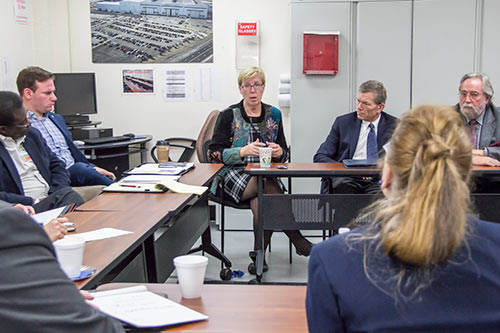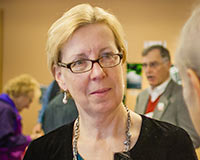Osten Leads Southeastern Connecticut/Western Rhode Island Discussion on Regional Economic Development Efforts

Senator Osten and stakeholders convene for second meeting focused on collaboration to support region’s economy and workforce.
State Senator Cathy Osten (D-Sprague) recently convened the second in a series of regional economic development roundtables to discuss how elected officials, organizations, colleges and employers can collaborate across the Connecticut-Rhode Island state line to support the region’s intertwined economy and workforce.
The second meeting—which included members of Rhode Island Senate Minority Leader Dennis Algiere’s staff, local Chambers of Commerce, town officials, Electric Boat, Dominion, and casino officials, among other partners—was held at the General Dynamics Electric Boat Quonset Point facility in Rhode Island. The group of stakeholders is working to determine cooperative legislative priorities to introduce in each state’s upcoming legislative session.
The working group’s discussion focused largely on effectively marketing advanced manufacturing technology programs at community colleges in both states, in order to prepare workers for the more than 25,000 high-skilled manufacturing and defense industry jobs that will come online in Connecticut in the next several years through Electric Boat, Pratt & Whitney, Sikorsky/Lockheed Martin and businesses throughout the supply chain; examining how guidance counselors and schools are promoting certificate programs to students as a viable option toward a career outside of a traditional four-year college degree; and addressing quality of life in the region to retain military families, veterans and young professionals.
“These summits have allowed us to identify our shared assets and needs, with input from local officials, the business community, our large employers and our community colleges, and others,” said Sen. Osten. “Moving forward, we plan to develop three key points that we can focus on in terms of legislation, with a goal of submitting parallel legislation in each state. We want to ensure we are working together—and not competing with each other—to advance our goals for what is truly a shared economy.”
Howard Jenkins, Manager of Human Resources—Diversity and Outreach at General Dynamics Electric Boat located in Groton, noted that a concerted effort must be made to change the way parents of middle and high school students think about the manufacturing field, and how those careers have changed in the 21st century.
“We need to get them excited about this,” said Jenkins. “Not everyone will be going to college. Statistics identify that 35 percent of kids enroll in college, and 60 percent of them don’t finish. Essentially, that means that 70 percent of our youth aren’t going to college or graduating with a degree. We need to get them an advanced certificate or training in manufacturing, because we have a huge advantage when it comes to the training that’s available locally at Three Rivers Community College in Norwich and Quinebaug Valley in Danielson, and due to the number of jobs that will need to be filled in the region over time.”
John Beauregard, President of the Eastern CT Workforce Investment Board (EWIB), agreed that focusing on connecting students with programs that prepare them for good paying jobs in the manufacturing and defense sector is key.
“The ‘25,000 jobs’ number is real. Getting young people interested in this field is important, but what is equally important is recognizing opportunities to build our pool of skilled labor,” said Beauregard. “For example, look at all of the people who are under-employed in their 20s. They are working part-time, but fixing motorcycles on the weekend. They are good with their hands. We need to get them on the path where they are reaching their maximum potential in the workforce.”
Near the end of the Quonset Point meeting, Paige Bronk, the Manager of Economic and Community Development for the Town of Groton—who previously served in the same position in North Kingstown, Rhode Island—endorsed the efforts of Sen. Osten and other stakeholders to break down what many around the table called the “invisible border” between Connecticut and Rhode Island.
“I am glad that we are working together, and it’s imperative that we stay together on this front,” said Bronk, who lives in Rhode Island and works in Connecticut. “I think breaking down the imaginary line between our two states, especially on the coast, is imperative to our synergy as a region.”
Share this page:
